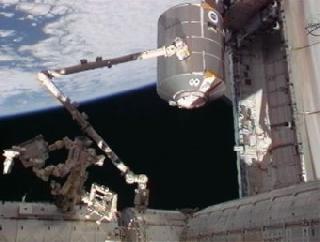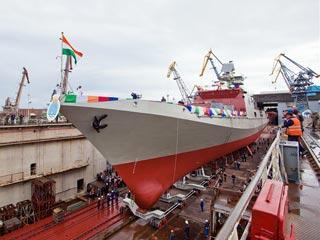
The ISS's robotic arm, Canadarm2, operated by STS-135 astronauts Doug Hurley and Sandy Magnus, grapples the Raffaello multipurpose logistics module from Atlantis' payload bay. A NASA TV photo
HOUSTON (PTI): US space shuttle Atlantis' astronauts entered the newly-installed Raffaello cargo module Monday as NASA ruled out any threat to the shuttle or to the International Space Station from a piece of space junk.
NASA officials said that no adjustments are needed to be made in the path of the space shuttle, which it appeared earlier could be threatened by the space junk from an old Soviet satellite.
"Mission Control has verified that the track of a piece of orbital debris will not be a threat to the International Space Station and space shuttle Atlantis," agency officials said in a statement.
"No adjustments to the docked spacecraft's orbit will be necessary to avoid the debris."
The US military's Space Surveillance Network notified NASA of the wandering piece of space trash Sunday, and the agency began tracking the object's orbit to determine if it would fly uncomfortably close to the station and require some kind of maneuver to avoid a collision.
Shuttle commander Chris Ferguson and mission specialist Sandy Magnus opened up the door to the Raffaello module and floated inside shortly after noon.
The astronauts wore masks and protective eyewear to shield against any dust or debris from the ground that may be floating around inside the pod.
The astronauts will now begin the laborious task of unpacking the 4,300 kilogrammes of cargo inside the module.
This work will continue for the rest of the week.
The remainder of the day will be spent making final preparations for Tuesday’s spacewalk, which will be conducted by station astronauts Ron Garan and Mike Fossum.
In a news briefing Monday, LeRoy Cain, chair of Atlantis' mission management team, said that initial assessments estimated that the debris would make its closest approach to the station Tuesday during a scheduled spacewalk by station astronauts Ron Garan and Mike Fossum.
The orbital debris is part of a defunct Soviet satellite called Cosmos 375 and is one of more than 500,000 pieces of space junk that are continuously catalogued and tracked in Earth's orbit, NASA officials said.
The space station was actually boosted out of harm's way when Atlantis docked at the orbiting outpost Monday.
The relative motion of the two spacecraft as they joined together serendipitously pushed the station into a slightly higher orbit, making it unnecessary for mission managers to take any further action, NASA officials said.
The space station typically flies in an orbit about 354 kilometres above Earth.
To guard against space junk collisions, NASA maintains a pizza box-shaped safety zone that measures just over 25 km around the space station and about 0.75 km above and below the outpost.
Earth's orbit is littered with spent rocket parts and pieces of broken satellites that range in size, which poses an ongoing problem for spacecraft and satellites that sometimes have to dodge out of the way.
NASA and its space station partners have procedures in place to deal with potentially threatening pieces of orbital debris if they fly within a preset safety perimeter around the station and spacecraft.
With advance notice, thrusters on the space station itself, or attached vehicles such as the shuttle or Russian Soyuz spacecraft, can be used to move the complex to a higher orbit to get out of the way.
NASA and the US military have been studying new ways to reduce or remove the amount of space debris in Earth orbit.
Earlier in a conference on space activities, US Air Force Space Command commander Gen William Shelton had said that if the orbital debris problem is not dealt with properly, the amount of space junk around Earth could triple by 2030.
 Previous Article
Previous Article Next Article
Next Article













The Indian Air Force, in its flight trials evaluation report submitted before the Defence Ministry l..
view articleAn insight into the Medium Multi-Role Combat Aircraft competition...
view articleSky enthusiasts can now spot the International Space Station (ISS) commanded by Indian-American astr..
view article